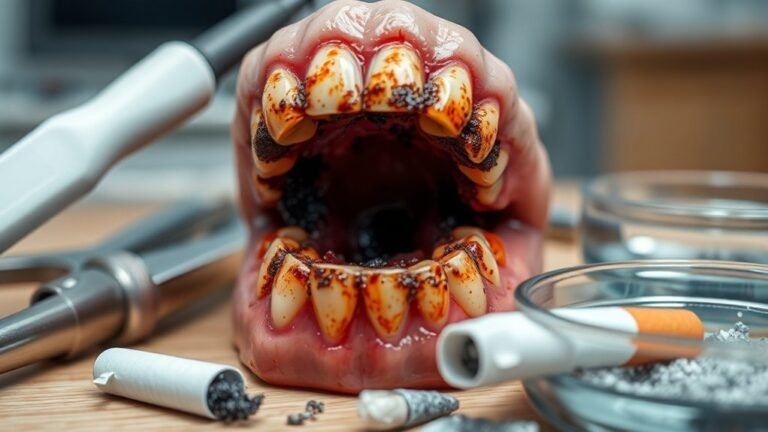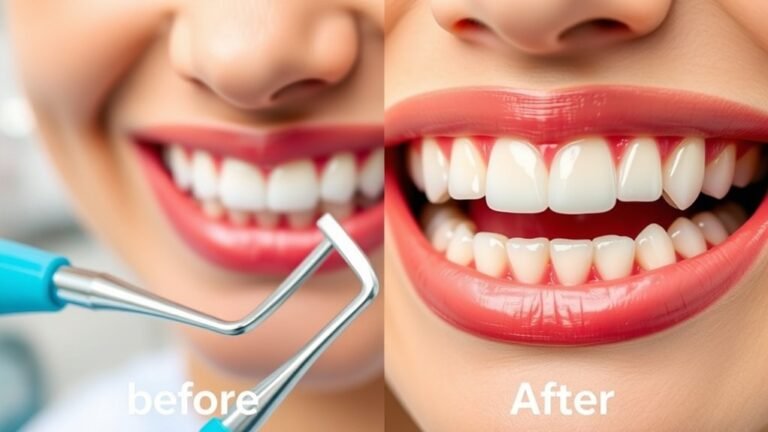What Lifestyle Changes Support Healthy Oral Bacterial Communities and Prevent Infections
To support healthy oral bacterial communities and prevent infections, focus on a balanced diet rich in whole foods while limiting sugar and processed items. Stay hydrated by drinking plenty of water, which helps wash away bacteria. Manage stress through mindfulness techniques to maintain oral hygiene. Regular dental check-ups are essential for early detection of issues. Avoid tobacco and alcohol, as these disrupt your oral microbiome. Discover more ways to enhance your oral health and well-being.
Key Takeaways
- Maintain a diet rich in whole foods, fruits, and vegetables to support beneficial oral bacteria and reduce harmful ones.
- Stay hydrated by drinking at least eight 8-ounce glasses of water daily to wash away food particles and bacteria.
- Manage stress through mindfulness practices, exercise, and deep-breathing techniques to prevent gum disease and tooth grinding.
- Schedule regular dental check-ups for early detection of cavities and professional cleaning to maintain oral health.
- Avoid tobacco and limit alcohol consumption to protect oral microbiome balance and reduce the risk of infections.
The Impact of Diet on Oral Bacteria
When you consider your overall health, it’s easy to overlook the crucial role diet plays in maintaining a balanced oral microbiome. The foods you consume directly influence the types of bacteria thriving in your mouth. A diet high in sugar and processed foods can promote harmful bacteria, leading to cavities and gum disease. Conversely, incorporating whole foods, like fruits, vegetables, and whole grains, supports beneficial bacteria that contribute to oral health. Additionally, probiotics found in yogurt and fermented foods may enhance your microbiome balance. Remember, what you eat isn’t just about your body; it’s equally important for your oral health. By making mindful dietary choices, you can foster a thriving environment for your oral bacteria, promoting overall well-being.
Hydration: The Key to a Balanced Oral Microbiome
Staying hydrated is essential for maintaining a balanced oral microbiome. When you don’t drink enough water, dehydration can disrupt the natural balance of bacteria in your mouth, leading to potential oral health issues. Prioritizing proper hydration helps support your body’s defenses against harmful bacteria and promotes overall oral health.
Importance of Water Intake
Although many people overlook it, adequate water intake is essential for maintaining a balanced oral microbiome. Water plays an important role in washing away food particles and bacteria, reducing plaque buildup and preventing cavities. When you’re well-hydrated, saliva production increases, which is critical for neutralizing acids and providing necessary minerals to your teeth. Additionally, saliva supports the growth of beneficial bacteria while inhibiting harmful pathogens. By ensuring you drink enough water throughout the day, you not only promote oral health but also support overall well-being. Aim for at least eight 8-ounce glasses daily, and remember that hydration can vary based on activity level and climate. Prioritize water intake to foster a thriving oral environment and prevent infections.
Effects of Dehydration
Dehydration can greatly disrupt the delicate balance of your oral microbiome, leading to a host of dental issues. Reduced saliva flow can create a dry mouth, which promotes harmful bacteria growth and increases the risk of cavities and gum disease. Staying hydrated is essential for maintaining a healthy oral environment.
| Effect of Dehydration | Impact on Oral Health |
|---|---|
| Decreased saliva flow | Increased bacterial growth |
| Dry mouth | Higher risk of tooth decay |
| Impaired taste sensation | Reduced enjoyment of food |
| Difficulty swallowing | Potential for digestive issues |
The Role of Stress Management in Oral Health
Managing stress effectively is essential for maintaining not just mental well-being but also oral health. High stress levels can lead to behaviors that negatively impact your oral hygiene, such as neglecting daily routines or consuming unhealthy foods. Stress can also contribute to conditions like gum disease and tooth grinding, which can further harm your dental health. Implementing stress reduction techniques—such as mindfulness, exercise, or deep-breathing exercises—can help you manage stress and promote a healthier oral environment. By prioritizing stress management, you not only enhance your overall mental state but also support the balance of oral bacteria. Remember, a calm mind can lead to a healthier mouth, reducing the risk of infections and promoting better oral health outcomes.
Importance of Regular Dental Check-ups
Maintaining a calm mind is beneficial for your overall health, including your oral hygiene. Regular dental check-ups are essential for maintaining healthy oral bacterial communities and preventing infections. These visits allow your dentist to identify potential issues before they escalate, ensuring your mouth stays healthy.
| Benefits of Regular Check-ups | Impact on Oral Health |
|---|---|
| Early detection of cavities | Prevents further decay |
| Gum disease assessment | Maintains healthy gums |
| Professional cleaning | Reduces plaque and tartar buildup |
| Personalized oral care advice | Supports ideal oral hygiene |
Avoiding Tobacco and Alcohol for Better Oral Flora
While you may enjoy an occasional drink or smoke, avoiding tobacco and alcohol is essential for preserving a healthy oral microbiome. Both substances can markedly disrupt the balance of bacteria in your mouth, leading to issues like gum disease and tooth decay. Tobacco use, in particular, is linked to a higher risk of oral infections and can hinder your body’s ability to heal. If you’re considering smoking cessation, know that quitting can greatly benefit your oral health. Alcohol can also contribute to dry mouth, which allows harmful bacteria to thrive. By reducing or eliminating these habits, you’re taking proactive steps to maintain a thriving oral ecosystem, ultimately supporting your overall health and well-being.
Incorporating Probiotics for a Healthier Mouth
Incorporating probiotics into your daily routine can greatly enhance your oral health by promoting a balanced microbiome. Probiotics, found in yogurt, kefir, and supplements, introduce beneficial bacteria that help combat harmful oral pathogens. These good bacteria can reduce plaque formation and lower the risk of gingivitis and cavities. By fostering a healthy bacterial community, probiotics also support your immune system, making it easier for your body to fight off infections. Try to consume probiotic-rich foods regularly or consider taking a high-quality probiotic supplement specifically designed for oral health. Remember, a balanced microbiome not only improves your mouth’s condition but also contributes to overall well-being. Prioritizing probiotics is a simple yet effective step toward a healthier mouth.
Frequently Asked Questions
How Often Should I Brush My Teeth for Optimal Oral Health?
You should brush your teeth at least twice a day for ideal oral health. Use fluoride toothpaste and a soft-bristled toothbrush, ensuring you clean all surfaces effectively to remove plaque and prevent cavities.
Can Mouthwash Harm My Oral Bacterial Balance?
Yes, mouthwash can harm your oral bacterial balance if used excessively. Some formulations kill beneficial bacteria, disrupting your microbiome. Use it sparingly, focusing on good brushing and flossing for healthier oral communities.
What Are the Signs of an Unhealthy Oral Microbiome?
You might notice bad breath, gum inflammation, frequent cavities, or unusual taste if your oral microbiome’s unhealthy. These signs indicate an imbalance, suggesting you should consult a dental professional for guidance on improving your oral health.
Are There Specific Foods That Harm Oral Bacteria?
Yes, sugary foods and beverages harm oral bacteria by promoting harmful microbial growth. Acidic items, like soda and citrus, can erode enamel, further destabilizing your oral microbiome. Choose healthier options to support your oral health.
How Does Sleep Impact Oral Health and Bacteria?
You might think sleepless nights don’t affect your mouth, but they do. Lack of sleep disrupts oral bacteria balance, increasing infection risks. Prioritize rest to support your oral health and maintain a thriving bacterial community.
Conclusion
Incorporating these lifestyle changes can greatly enhance your oral health and support a balanced bacterial community. Did you know that nearly 50% of adults over 30 have some form of gum disease, often linked to poor oral hygiene and lifestyle choices? By focusing on diet, hydration, stress management, and regular dental visits, while avoiding tobacco and alcohol, you can reduce your risk of infections and foster a healthier mouth. Embrace these habits for lasting oral wellness.






